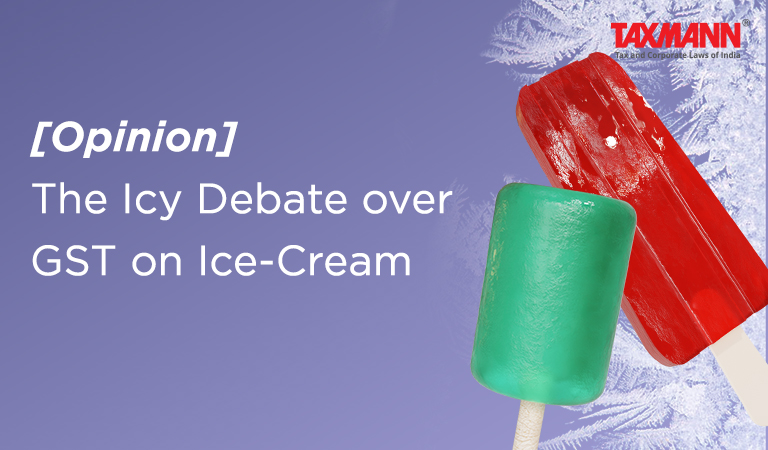[Opinion] The Icy Debate over GST on Ice-Cream
- Blog|News|GST & Customs|
- 2 Min Read
- By Taxmann
- |
- Last Updated on 5 April, 2023

Jigar Doshi & Yash Goenka – [2023] 149 taxmann.com 35 (Article)
Before indulging in your icy treat, make sure to peruse this document to ensure you’re fully informed on the GST rate applicable to your favourite frozen delight.
1. Introduction
In today’s fast-paced world, the food industry has undergone significant transformations in recent years, shifting from traditional restaurants where food is cooked and served on-premises to a variety of new business models such as quick service outlets selling food over the counter, online food ordering platforms and cloud kitchens. These changes represent a fundamental shift in how people consume food, with a growing preference for convenience and speed. As a result, food businesses are adapting and innovating to meet the changing demands of consumers and stay competitive in the industry.
As the food industry undergoes a significant shift in its business model, the government is also attempting to expand the scope of GST to ensure that it remains relevant and effective in capturing the tax liabilities of businesses operating in this sector. Therefore, the government is actively reviewing and updating its policies to keep pace with the evolving food industry.
However, the implications of GST on the food industry are not always well-received. This sector had raised concerns which are often not fully addressed leading to unresolved doubts regarding the taxability under the GST regime. In this article, we look at complexities of the GST system and its impact on businesses, particularly those in the restaurant industry.
2. Authority for Advance Rulings (AAR) on GST on ice cream
A recent advance ruling issued by the Gujarat AAR HRPL Restaurants (P.) Ltd., In re [2023] 148 taxmann.com 426 regarding the taxability of ice cream sold from restaurant outlets has created a stir in the industry. The authority announced the order on an application filed by Ahmedabad-based HRPL Restaurant, which runs a chain of eating joints. The Authority ruled as under:
- The ice cream sold by outlets of the applicant is already manufactured i.e., it is not prepared in their outlets. Therefore, it was held that ice cream sold by the applicant’s outlet over the counter would not fall within the ambit of ‘restaurant service’ and is supply of goods. Hence, it would attract GST at the rate of 18%.
- The supply of ice cream, served as a dessert by the outlets of the Applicant along with cooked or prepared food would assume the character of composite supply, wherein the prepared food would be the principal supply and hence it qualifies as ‘restaurant services’. leviable to GST @ 5% with no input tax credit.
- The supply by restaurants of only pre-packaged ice cream that is readily available and not prepared on-site, will be subject to GST at a rate of 18%. This means that even if the ice cream is sold from one of the applicant’s outlets, it will be taxed at the same rate as ice cream sold from a standalone ice cream parlour.
Click Here To Read The Full Article
Disclaimer: The content/information published on the website is only for general information of the user and shall not be construed as legal advice. While the Taxmann has exercised reasonable efforts to ensure the veracity of information/content published, Taxmann shall be under no liability in any manner whatsoever for incorrect information, if any.

Taxmann Publications has a dedicated in-house Research & Editorial Team. This team consists of a team of Chartered Accountants, Company Secretaries, and Lawyers. This team works under the guidance and supervision of editor-in-chief Mr Rakesh Bhargava.
The Research and Editorial Team is responsible for developing reliable and accurate content for the readers. The team follows the six-sigma approach to achieve the benchmark of zero error in its publications and research platforms. The team ensures that the following publication guidelines are thoroughly followed while developing the content:
- The statutory material is obtained only from the authorized and reliable sources
- All the latest developments in the judicial and legislative fields are covered
- Prepare the analytical write-ups on current, controversial, and important issues to help the readers to understand the concept and its implications
- Every content published by Taxmann is complete, accurate and lucid
- All evidence-based statements are supported with proper reference to Section, Circular No., Notification No. or citations
- The golden rules of grammar, style and consistency are thoroughly followed
- Font and size that’s easy to read and remain consistent across all imprint and digital publications are applied



 CA | CS | CMA
CA | CS | CMA
